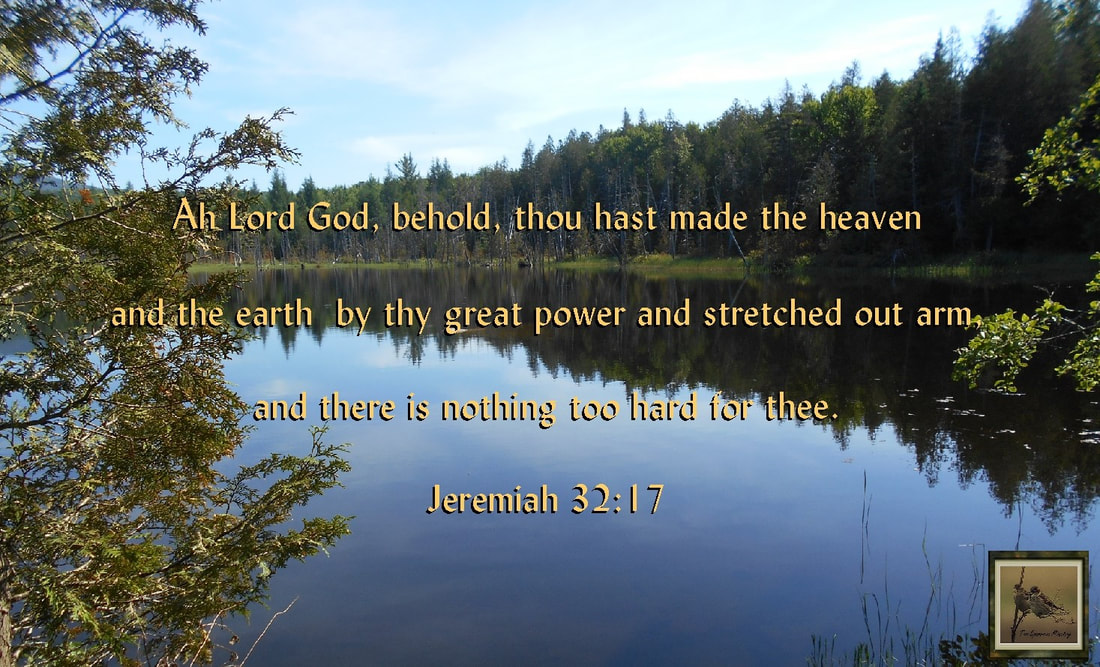Jeremiah’s faith
Jer 32:9 And I bought the field of Hanameel my uncle's son, that was in Anathoth, and weighed him the money, even seventeen shekels of silver.
Jer 32:9 And I bought the field of Hanameel my uncle's son, that was in Anathoth, and weighed him the money, even seventeen shekels of silver.
I. Faith is here illustrated as resting exclusively upon the word of God. All that Jeremiah did in this matter he did just because he had a command from the Lord. Whilst he was in prison, God told him that his cousin should come and offer him the redemption of a part at least of the family inheritance. The man came, and he “knew that this was the Word of the Lord”; therefore he bought the field. It is not to be supposed that he was rich. The probability is that he may have had to get the money for the purchase from his friend Baruch. Neither had he any expectation of himself obtaining any personal benefit from the purchase, for he believed that the city would be given into the hands of the Chaldeans, that the people would be taken for seventy years as exiles to Babylon. This is the very nature of true faith; it does the thing, or it receives the thing, it fears or it hopes, as the case may be wholly because God has spoken. If it embraces a promise, it rests its hope upon the Word of the Lord. If it is moved by fear, it is because God has denounced an impending punishment. If it acts in a particular way, it follows exactly the path which God has marked out. Resting as it does entirely upon the Word of God, it is altogether independent of reason, although it does not refuse to listen to its voice. Faith receives testimony; our faith in men leads us to receive the testimony of men. We often receive that testimony although we have no other evidence whatever of the facts we believe. Nay, we receive it although we have found the very persons whose testimony we are now relying upon to have been, in some instances, at least, mistaken. Faith in men goes thus far; it must go thus far; we are compelled to act in this way, or we should cut ourselves off from mankind and the activities of life. But if this be so, if we find it necessary and reasonable to act in this way, receiving the testimony of men, shall we not receive the testimony of God? When He speaks it is for us simply to listen. How wondrously has God spoken! “In the beginning” “God created the heavens and the earth. Going on from that primary revelation, He has revealed more and more of His truth; and in proportion as our minds rise, in proportion as our moral sense is cultivated, in proportion as we get free from the degrading power of evil which perverts our moral judgment, we find the revelation to be in accordance with everything we might expect. He speaks to us of things which are far beyond the reach of human knowledge and experience, testimony or deduction. He sets before us His own dear Son incarnate in our nature, and tells us of the great purpose for which He came.
II. This passage teaches us also that faith takes account of difficulties and improbabilities only so far as to refer them to him. We must pass on to a later portion of the chapter to illustrate this. When Jeremiah had purchased the field, and subscribed the deeds and sealed them, and they were deposited in the custody of Baruch in an earthen jar to be kept for a considerable time, he seems to have experienced what we all know, some kind of reaction Of feeling; and then, as if he almost felt that he had done something that he was hardly warranted in doing, he goes and lays the matter before God (verses 17-25). This must certainly have seemed strange to any person who did not understand that it was God’s Word. That a man who was in prison should buy an estate, believing as he did that before long the country would be in the hands of the Chaldeans, who would recognize no title-deeds whatever; that he should carefully go through the forms of Jewish law to acquire the estate, really appeared a most foolish thing. It seems as if those thoughts, so natural to us, came back upon Jeremiah’s mind, and he began to think of the difficulties and the probabilities of the case. You see that this is not a prayer for a blessing upon what he had done; it is not a prayer that the matter in which he had been engaged should be successful; but it is an utterance of wavering and distracted feeling; and that wavering and distracted feeling is rightly uttered to God. We all know perfectly well that faith as it exists in us is not complete in its power. Sometimes we can look over, we might almost say, the boundaries of our earthly horizon and see the gates of the heavenly Jerusalem and the hills of the celestial city, but at other times the depths of the valley of the shadow of death seem to hide it all from our view. Sometimes we can hold firmly to the truth which God has been pleased to set before us with unequivocal assertion, and with demonstration of power to our believing heart; but at other times our grasp upon it seems to relax, and it appears almost as if it would slip through our hands. When there is anything of this, what will a person who really has faith do, although that faith may not be in the most perfect state and in the fullest exercise? He will take all his difficulty to God. Do we find any difficulties about the way of salvation? Let us go and ask God to throw light, as far as that light is necessary, upon the truths whereby we are to be saved. Is there any question about my own connection with, or interest in, the work of Christ? Let me go and spread it before God, and ask Him to make my salvation clear to me. God never said that there should be no difficulty in the Christian’s path. God never told us that there should be nothing hard to understand in the truth that the Christian has to believe respecting Himself.(Excerpt from Expositor's bible)
II. This passage teaches us also that faith takes account of difficulties and improbabilities only so far as to refer them to him. We must pass on to a later portion of the chapter to illustrate this. When Jeremiah had purchased the field, and subscribed the deeds and sealed them, and they were deposited in the custody of Baruch in an earthen jar to be kept for a considerable time, he seems to have experienced what we all know, some kind of reaction Of feeling; and then, as if he almost felt that he had done something that he was hardly warranted in doing, he goes and lays the matter before God (verses 17-25). This must certainly have seemed strange to any person who did not understand that it was God’s Word. That a man who was in prison should buy an estate, believing as he did that before long the country would be in the hands of the Chaldeans, who would recognize no title-deeds whatever; that he should carefully go through the forms of Jewish law to acquire the estate, really appeared a most foolish thing. It seems as if those thoughts, so natural to us, came back upon Jeremiah’s mind, and he began to think of the difficulties and the probabilities of the case. You see that this is not a prayer for a blessing upon what he had done; it is not a prayer that the matter in which he had been engaged should be successful; but it is an utterance of wavering and distracted feeling; and that wavering and distracted feeling is rightly uttered to God. We all know perfectly well that faith as it exists in us is not complete in its power. Sometimes we can look over, we might almost say, the boundaries of our earthly horizon and see the gates of the heavenly Jerusalem and the hills of the celestial city, but at other times the depths of the valley of the shadow of death seem to hide it all from our view. Sometimes we can hold firmly to the truth which God has been pleased to set before us with unequivocal assertion, and with demonstration of power to our believing heart; but at other times our grasp upon it seems to relax, and it appears almost as if it would slip through our hands. When there is anything of this, what will a person who really has faith do, although that faith may not be in the most perfect state and in the fullest exercise? He will take all his difficulty to God. Do we find any difficulties about the way of salvation? Let us go and ask God to throw light, as far as that light is necessary, upon the truths whereby we are to be saved. Is there any question about my own connection with, or interest in, the work of Christ? Let me go and spread it before God, and ask Him to make my salvation clear to me. God never said that there should be no difficulty in the Christian’s path. God never told us that there should be nothing hard to understand in the truth that the Christian has to believe respecting Himself.(Excerpt from Expositor's bible)
Jeremiah's Confidence
"Ah Lord God, behold, thou hast made the heaven and the earth by thy great power and stretched out arm, and there is nothing too hard for thee." — Jer_32:17
"Ah Lord God, behold, thou hast made the heaven and the earth by thy great power and stretched out arm, and there is nothing too hard for thee." — Jer_32:17
At the very time when the Chaldeans surrounded Jerusalem, and when the sword, famine and pestilence had desolated the land, Jeremiah was commanded by God to purchase a field, and have the deed of transfer legally sealed and witnessed. This was a strange purchase for a rational man to make. Prudence could not justify it, for it was buying with scarcely a probability that the person purchasing could ever enjoy the possession. But it was enough for Jeremiah that his God had bidden him, for well he knew that God will be justified of all his children. He reasoned thus: "Ah, Lord God! thou canst make this plot of ground of use to me; thou canst rid this land of these oppressors; thou canst make me yet sit under my vine and my fig-tree in the heritage which I have bought; for thou didst make the heavens and the earth, and there is nothing too hard for thee." This gave a majesty to the early saints, that they dared to do at God's command things which carnal reason would condemn. Whether it be a Noah who is to build a ship on dry land, an Abraham who is to offer up his only son, or a Moses who is to despise the treasures of Egypt, or a Joshua who is to besiege Jericho seven days, using no weapons but the blasts of rams' horns, they all act upon God's command, contrary to the dictates of carnal reason; and the Lord gives them a rich reward as the result of their obedient faith. Would to God we had in the religion of these modern times a more potent infusion of this heroic faith in God. If we would venture more upon the naked promise of God, we should enter a world of wonders to which as yet we are strangers. Let Jeremiah's place of confidence be ours-nothing is too hard for the God that created the heavens and the earth.
(C.H. Spurgeons Evening devotion)
(C.H. Spurgeons Evening devotion)









